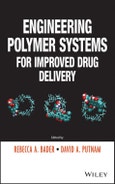Polymers have played a critical role in the rational design and application of drug delivery systems that increase the efficacy and reduce the toxicity of new and conventional therapeutics. Beginning with an introduction to the fundamentals of drug delivery, Engineering Polymer Systems for Improved Drug Delivery explores traditional drug delivery techniques as well as emerging advanced drug delivery techniques. By reviewing many types of polymeric drug delivery systems, and including key points, worked examples and homework problems, this book will serve as a guide to for specialists and non-specialists as well as a graduate level text for drug delivery courses.
Table of Contents
FOREWORD xi
PREFACE xiii
CONTRIBUTORS xv
PART I INTRODUCTION 1
1 FUNDAMENTALS OF DRUG DELIVERY 3
Rebecca A. Bader
1.1 Introduction: History and Future of Drug Delivery 3
1.2 Terminology 5
1.3 Basic Pharmacokinetics 8
1.4 Basic Pharmacodynamics 12
1.5 Mass Transfer 13
1.6 Key Points 23
1.7 Homework Problems 23
2 CHALLENGES OF DRUG DELIVERY 29
Patricia R. Wardwell and Rebecca A. Bader
2.1 Introduction 29
2.2 History and Challenges of Drug Delivery 30
2.3 Physical Barriers 31
2.4 Metabolic and Chemical Concerns 39
2.5 Physical Properties of Therapeutics 42
2.6 Polymer Carriers as a Solution to Challenges 45
2.7 Key Points 50
2.8 Homework Problems 50
PART II INJECTABLE POLYMERIC DRUG DELIVERY SYSTEMS 55
3 POLYMER–DRUG CONJUGATES 57
Cristina Fante and Francesca Greco
3.1 Introduction 57
3.2 Historical Perspective 58
3.3 Polymer–Drug Conjugates: Biological Rationale 59
3.4 Structural Features of Polymer–Drug Conjugates 62
3.5 Making a Polymer–Drug Conjugate 68
3.6 Current Challenges and Future Perspectives 71
3.7 Key Points 75
3.8 Worked Example 76
3.9 Homework Problems 76
4 POLYMERIC MICROPARTICLES 85
Noelle K. Comolli and Colleen E. Clark
4.1 Introduction 85
4.2 The Rationale for Microparticles 86
4.3 Defining the Design Criteria 87
4.4 Polymer Selection 89
4.5 Microparticle Synthesis 91
4.6 Microparticle Characterization Methods 96
4.7 Drug Release from Microparticles 100
4.8 Microparticle Design Examples 108
4.9 Key Points 110
4.10 Worked Example 110
4.11 Homework Problems 111
5 POLYMERIC NANOPARTICLES 117
Andrew L. Vasilakes, Thomas D. Dziubla, and Paritosh P. Wattamwar
5.1 Introduction 117
5.2 PNP Design 124
5.3 PNP Formulation Methods and Targeting 128
5.4 Nanoparticle Targeting Overview 133
5.5 PNP Characterization 139
5.6 Major Clinical Achievements 147
5.7 Key Points 148
5.8 Worked Example 149
5.9 Homework Problems 150
6 BLOCK COPOLYMER MICELLES AND VESICLES FOR DRUG DELIVERY 163
James D. Robertson, Nisa Patikarnmonthon, Adrian S. Joseph, and Giuseppe Battaglia
6.1 Introduction 163
6.2 Drug Encapsulation and Release 165
6.3 Bioavailability and Biodistribution 166
6.4 Stimuli Responsiveness 170
6.5 The Immune System 174
6.6 Gene Therapy 177
6.7 Cancer Therapy 180
6.8 Conclusions 182
6.9 Key Points 182
6.10 Homework Problems 183
PART III IMPLANTABLE POLYMERIC DRUG DELIVERY SYSTEMS 189
7 IMPLANTABLE DRUG DELIVERY SYSTEMS 191
Luis Solorio, Angela Carlson, Haoyan Zhou, and Agata A. Exner
7.1 Introduction 191
7.2 Nondegradable Polymeric Implants 193
7.3 Biodegradable Polymeric Implants 198
7.4 Conclusions and Future Perspectives 215
7.5 Key Points 216
7.6 Homework Problems 216
8 POLYMERIC DRUG DELIVERY SYSTEMS IN TISSUE ENGINEERING 227
Matthew Skiles and James Blanchette
8.1 Introduction 227
8.2 Wound Healing as a Prototype for Adult Tissue Generation 228
8.3 Bioactive Factors in Tissue Engineering and Regenerative Medicine 232
8.4 Delivery of Growth Factors in Tissue Engineering and Regenerative Medicine 248
8.5 Key Points 268
8.6 Worked Example 269
8.7 Homework Problems 270
PART IV ORAL POLYMERIC DRUG DELIVERY SYSTEMS 283
9 ORAL CONTROLLED-RELEASE POLYMERIC DRUG DELIVERY SYSTEMS 285
James W. McGinity, James C. DiNunzio, and Justin M. Keen
9.1 Introduction 285
9.2 Release Mechanisms of Oral Polymeric Dosage Forms 288
9.3 Oral Polymeric Release Modifiers 295
9.4 Manufacturing Technologies and Industrial Applications of Controlled Release 297
9.5 Worked Example 311
9.6 Key Points 314
9.7 Homework Problems 314
10 MUCOADHESIVE DRUG DELIVERY SYSTEMS 319
Srinath Muppalaneni, David Mastropietro, and Hossein Omidian
10.1 Introduction 319
10.2 Factors Affecting Mucoadhesion 320
10.3 Polymer–Mucus Interactions 320
10.4 Mucoadhesion Mechanisms 322
10.5 Mucoadhesive Polymers 324
10.6 Novel Mucoadhesive Materials 327
10.7 Mucoadhesion Testing 330
10.8 Drug Release Studies 332
10.9 Mucoadhesive Dosage Forms 332
10.10 Conclusion 334
10.11 Key Points 334
10.12 Homework Questions 337
11 ENHANCED ORAL DRUG DELIVERY THROUGH METABOLIC PATHWAYS 343
Gregory Russell-Jones
11.1 Introduction 343
11.2 Uptake of Nutrients from the Intestine 344
11.3 Nutrient Transport in the Intestine 349
11.4 Use of Nutrient Transporters for Drug Delivery 352
11.5 Case Study: The Use of the Vitamin B2 Uptake System for Drug Delivery 352
11.6 Key Points 365
11.7 Worked Example 365
11.8 Homework Problems 366
PART V ADVANCED POLYMERIC DRUG DELIVERY 375
12 STIMULI-RESPONSIVE POLYMER DELIVERY SYSTEMS 377
Amy Van Hove, Zhanwu Cui, and Danielle S.W. Benoit
12.1 Introduction 377
12.2 Temperature-Responsive Polymers for Drug Delivery 378
12.3 pH-Responsive Polymers for Drug Delivery 387
12.4 Reduction/Oxidation (Redox)-Responsive Polymers 397
12.5 Enzymatically Responsive Drug Delivery 403
12.6 Key Points 415
12.7 Homework Questions 416
13 AFFINITY-BASED DRUG DELIVERY 429
Andrew S. Fu and Horst A. von Recum
13.1 Introduction 429
13.2 Association Constant 430
13.3 Worked Example 432
13.4 Affinity-Based Drug Delivery Systems 437
13.5 Mathematical Modeling of Affinity-Based Systems 444
13.6 Challenges and Future Directions 448
13.7 Key Points 448
13.8 Homework Problems 449
INDEX 453








